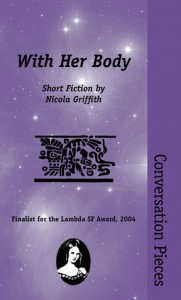Currently reading
A Creature of Moonlight
Saffron And Brimstone: Strange Stories
Captain Vorpatril's Alliance
Snow in May: Stories
With Her Body (Conversation Pieces, Volume 2)
 I've loved Nicola Griffith's writing since her first, Nebula-award-winning book, Ammonite, and have read all of her novels up until her most recent, 'Hild' - which I'm on the waitlist for at the library. I can't say how very delighted I am at the amount of mainstream attention and success it looks like 'Hild' is getting - Griffith well-deserves it. But, while I'm waiting, I got this brief collection of 3 short stories.
I've loved Nicola Griffith's writing since her first, Nebula-award-winning book, Ammonite, and have read all of her novels up until her most recent, 'Hild' - which I'm on the waitlist for at the library. I can't say how very delighted I am at the amount of mainstream attention and success it looks like 'Hild' is getting - Griffith well-deserves it. But, while I'm waiting, I got this brief collection of 3 short stories.Each of these stories fully deserves 5 stars. While each is a unique and very different work, they do share certain themes. In each a woman experiences desire/love, a need for human connection, loss, and the need to move on.
The first piece, 'Touching Fire,' is the only one I'd previously read. It's available for free from Griffith's web site:
nicolagriffith.com/fire.pdf
A bartender at a lesbian bar meets a fascinating and beautiful artist/dancer. She hints at an unlikely story, claiming to be an official 'National Treasure' who is guarded and controlled by the government. Is she crazy, truly exceptional, or both? The story perfectly captures the feeling of moth-to-a-flame love/desire.
'Song of Bullfrogs, Cry of Geese' shows us a woman in a post-apocalyptic world. A plague of lassitude has near-killed-off humanity. In mourning for her dead wife, an immunologist despairs, living alone in her housing complex, accepting aid from the nearby survivors, but refusing to go about the business of living, until a crisis point is reached.
This story is available for free from Lightspeed Magazine, online:
http://www.lightspeedmagazine.com/fiction/song-of-bullfrogs-cry-of-geese/
The last piece is the Nebula-award nominated novella, 'Yaguara.' A photographer travels to Belize to document an anthropologist's work. Upon arrival, her neurotic insistence on self-isolation and her fears of having her privacy violated, are almost immediately eroded by the primitive, close-quartered living conditions she finds herself in. She grows strangely attracted to the woman scientist she's there to photograph, as her perception of reality seems to become less and less reliable, and the ancient documentation of evidence of a female-oriented jaguar cult may not be so ancient after all...
There's also an 'afterword' by the editor of Aqueduct press, L. Timmel DuChamp. Personally, I'd recommend skipping it. As far as my rating goes, I'm just pretending it doesn't exist, as it's not Griffith's fault. It's an excellent example of how people can see what they really want to in something, if they come to it with a pre-determined political agenda. I simply don't see Griffith's writing as being about the things that Duchamp does. Yes, Griffith's characters are lesbians, but the relationships and interconnections they have are absolutely universally human; the emotions [and emotions' interplay with the physical body] are the focus, to the point where gender is almost irrelevant. The stories are about human nature. This is writing for everyone, not just for women.






